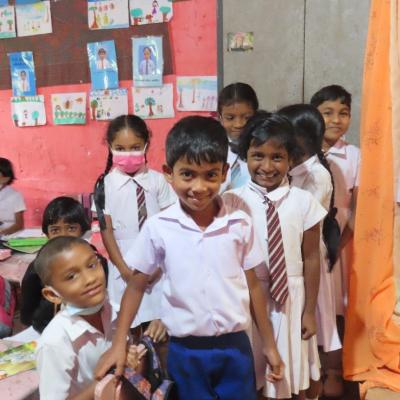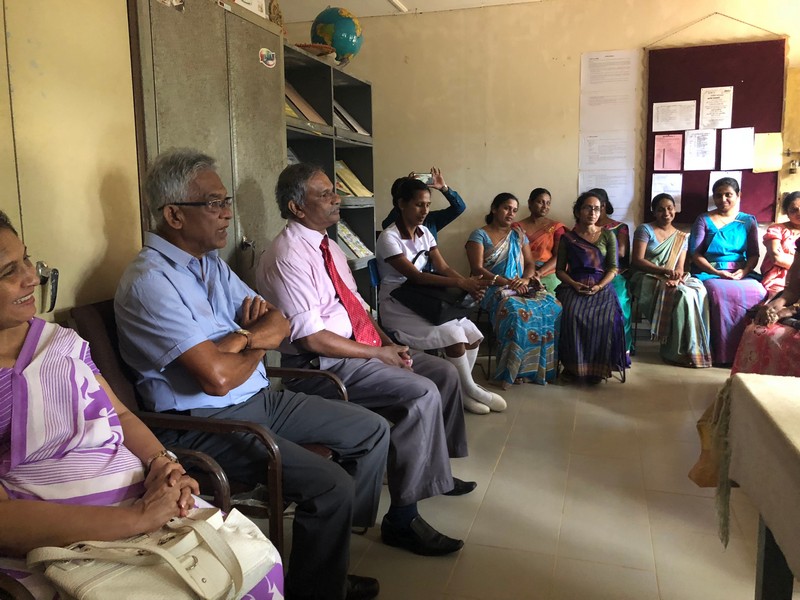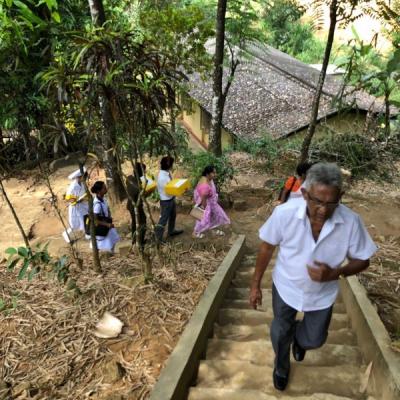Participants: Dr Chandani Galwaduge (Secretary), Dr Udaya Rajapakshe (Programme coordinator) and Mr Lucky Galwaduge (Treasurer) along with Ms Dilukshi Soyza (Health Promotion Facilitator). Following are the observations:
- Moving of Primary school classes: Year 4 and 5 classes have been moved into laboratory building as the building which housed these classes is in danger of damage due to earth slips that occurred end August.
- Midday meal preparation:
- The six-member steering committee of mothers are very active and remain dedicated.
- The cooking is done in the abandoned primary school building and the preparation was in progress. Four mothers were involved and they attempt to keep the hygienic standards to the optimum. Menu was green leaves mallum, carrot with potatoes and fried sprats. Although the building does not have a chimney for smoke to escape, the harm from smoke to children is not there as the building is not occupied.
- Mothers find firewood for cooking from the school premises.
- They also find green leaves from the village on a daily basis.
- Eggs had been in short supply for a few weeks and the school was able to buy the stock only on the day of our visit. Boiled eggs are given two days/ week.
- In addition to the 1-5 children, children of year six and the students who are sitting for the O.L. Examination (as they attend after-school classes conducted by the teachers) are provided the midday meal now.
- Nutritional status
- Seventeen Children in the primary section were identified as malnourished during the School Medical Inspection conducted by the Medical Officer of Health.
- Children are getting their weekly iron supplements at the school each Monday.
- Children were not given worm treatment due to non-availability of the same.
- Amongst the underweight children, there are a few who needs specific interventions from the field health staff.
- Progress of the Library activities:
- The Progress of the library activities is highly commendable since it was taken over by present teacher in Charge Ms Geetha Kumari.
- All classes in the school have a dedicated period for library.
- Each child is having a separate exercise book and the Teacher in Charge assess all of them before marking as completed reading the books.
- The Teacher in Charge maintains the progress for each class as well as for each child and she goes the extra mile to motivate the children who are not much into reading.
- It was commendable the way the Teacher in Charge had made use of the Literary month, September, to motivate children to draw the pictures to depict the concept/themes of the books they have read. Several children had written small booklets on various subjects they read at the library. The drawings and the writeups are of very good quality.
- Year 5 teacher described how the reading has improved in children; all children had improved in their pace as well as in comprehension.
- Teacher in Charge has taken the lead to request library books from the Department of Cultural affairs, Education Publication Department and Asia Foundation. School had already received 147 books from the Department of Cultural Affairs and The Education Publication Department had promised to provide books.
- Discussion with Year 9, 10 and 11 students:
- Ms Dilukshi, Health Promotion Facilitator conducted an interactive discussion with the students. Twenty-five students participated. Year 9 students were found to be more motivated in following the schedule that they agreed to improve their educational performance. The session comprised of many group activities in which students had chance to discuss the factors that hindered their progress and identify the strategies to overcome those. The students were very responsive and were forthcoming of their issues.
- Infrastructure supported by Sipsaru; Outdoor classroom, Pavilion/outdoor classroom, Kitchen/home science room and the toilets:
- It was very gratifying to note that all buildings that were constructed/ upgraded by the Sipsaru are in optimum use.
- All the toilets that were newly constructed/renovated by Sipsaru were clean. All had running water.
- We also saw the newly appointed dancing teacher conducting a practical class in the pavilion. The outdoor classroom is in daily use as a classroom and the we conducted the Health promotion programme in this space.
- GCE (O.L) examination crash programme:
- Teachers are conducting afterschool classes for the children who are sitting for the examination in May.
- School will obtain the services of resource persons for the subjects without teachers.
- Scholarship programme: School had purchased the needy educational supplies for a cost of Rs 220,000 using Sipsaru funds. This time twelve children (six each, girls and boys) are chosen per the agreed criteria. Seven are from the Primary section and the remaining from the secondary section.
- Discussion with the teaching staff: Two separate discussions were held with Primary section teachers and the teachers in the secondary school. As there were new appointees in the secondary school, we briefed them on the Sipsaru objectives, broad framework of activities and the progress we have made so far.We discussed about the midterm evaluation of the Sipsaru project. The following were agreed upon:
- The Primary section teachers will revive the Primary school band. Sipsaru will support to stitch the band costumes for students who cannot afford and to procure/ borrow a few Melodicas.
- The Primary section head will coordinate with the local Public Health Midwife regarding specific interventions for the undernourished children. The two underweight children who are living with another school parent due to family disharmony will be given priority. (Dr Udaya Rajapakshe will coordinate with a local NGO to procure the worm treatment for all children in the school and their families and to provide some dry rations to the family living in abject poverty, but supporting the undernourished children whose parents are not there with them.)
- Primary school will plan a sport meet as well as an English day.
- They also will conduct a few extracurricular activities such as art ad essay competitions.
- Secondary school will restart the organic farming project. Mr Sameera and the Principal will coordinate with Mr Navaratne Hettiarchchi and Sipsaru. A committee comprising two teachers residing in the village and two parents will be appointed to implement the programme. Vanilla and Anthurium will be prioritized. Mr Navaratne Hettiarchchi will continue to provide technical support as well as help finding a market for the products.
- They will plan a variety entertainment programme as well.
- Library drawings will be chosen and will be given certificates.
- The school will give opportunities for the children (oratory, compering and singing etc) at the weekly assembly.
- The secondary school will organize a Sports meet.
- Sipsaru will purchase the past paper books and other education related books for the library.
- Sipsaru will organize a visit by the Health promotion expert, Dr Manoj Fernando. As school is desirous of getting fathers also participating in the programme the school need at least one-week prior notification.
- Midterm evaluation of the Sipsaru project will be carried out by the independent consultant Dr Gamini Jayakody.
- The school with the assistance of Dr Udaya Rajapakshe will finalize their activity plan and will submit to Sipsaru.
There was a request to consider a midday meal for the Year 7-10 children at least once /week. The school also will explore the possibility of utilizing the already allocated funds for primary section from the Education Department for this purpose.















